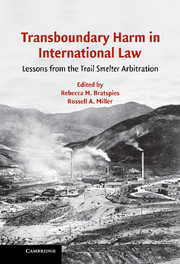Book contents
- Frontmatter
- Contents
- Contributors
- Acknowledgments
- Foreword by David D. Caron
- TRANSBOUNDARY HARM IN INTERNATIONAL LAW
- Introduction
- PART ONE THE TRAIL SMELTER ARBITRATION – HISTORY, LEGACY, AND REVIVAL
- PART TWO TRAIL SMELTER AND CONTEMPORARY TRANSBOUNDARY HARM – THE ENVIRONMENT
- PART THREE TRAIL SMELTER AND CONTEMPORARY TRANSBOUNDARY HARM – BEYOND THE ENVIRONMENT
- 18 Trail Smelter and Terrorism: International Mechanisms to Combat Transboundary Harm
- 19 The Conundrum of Corporate Social Responsibility: Reflections on the Changing Nature of Firms and States
- 20 A Pyrrhic Victory: Applying the Trail Smelter Principle to State Creation of Refugees
- 21 Transboundary Harm: Internet Torts
- 22 International Drug Pollution? Reflections on Trail Smelter and Latin American Drug Trafficking
- 23 Application of International Human Rights Conventions to Transboundary State Acts
- Annex A Convention Between the United States of America and the Dominion of Canada Relative to the Establishment of a Tribunal to Decide Questions of Indemnity and Future Regime Arising from the Operation of Smelter at Trail, British Columbia
- Annex B Trail Smelter Arbitral Tribunal Decision, April 16, 1938
- Annex C Trail Smelter Arbitral Tribunal March 11, 1941, Decision
- Index
19 - The Conundrum of Corporate Social Responsibility: Reflections on the Changing Nature of Firms and States
Published online by Cambridge University Press: 08 September 2009
- Frontmatter
- Contents
- Contributors
- Acknowledgments
- Foreword by David D. Caron
- TRANSBOUNDARY HARM IN INTERNATIONAL LAW
- Introduction
- PART ONE THE TRAIL SMELTER ARBITRATION – HISTORY, LEGACY, AND REVIVAL
- PART TWO TRAIL SMELTER AND CONTEMPORARY TRANSBOUNDARY HARM – THE ENVIRONMENT
- PART THREE TRAIL SMELTER AND CONTEMPORARY TRANSBOUNDARY HARM – BEYOND THE ENVIRONMENT
- 18 Trail Smelter and Terrorism: International Mechanisms to Combat Transboundary Harm
- 19 The Conundrum of Corporate Social Responsibility: Reflections on the Changing Nature of Firms and States
- 20 A Pyrrhic Victory: Applying the Trail Smelter Principle to State Creation of Refugees
- 21 Transboundary Harm: Internet Torts
- 22 International Drug Pollution? Reflections on Trail Smelter and Latin American Drug Trafficking
- 23 Application of International Human Rights Conventions to Transboundary State Acts
- Annex A Convention Between the United States of America and the Dominion of Canada Relative to the Establishment of a Tribunal to Decide Questions of Indemnity and Future Regime Arising from the Operation of Smelter at Trail, British Columbia
- Annex B Trail Smelter Arbitral Tribunal Decision, April 16, 1938
- Annex C Trail Smelter Arbitral Tribunal March 11, 1941, Decision
- Index
Summary
“We are fiddling, while Rome burns.”
INTRODUCTION
Although its value as precedent, paradigm, or standard-setter continues to be disputed, the Trail Smelter arbitration plays an important place in our contemporary search for adequate instruments and forms of international environmental regulation. Already the various contexts in which reference is made to Trail Smelter communicate its multifaceted messages. Through the eyes of today, the Trail Smelter arbitration might seem outdated or skewed, in particular its disputed construction of Canada's responsibility for the transboundary harm that was brought about by a private enterprise. And yet, whereas Trail Smelter stands apart from the later development of international law and the doctrine of state responsibility, it continues to engage our imagination. Trail Smelter continues to resurface as a starting point for thinking about adequate ways to resolve border crossing environmental conflicts, but also other forms of transboundary harm. It does so, precisely, by inspiring ongoing inquiries into the right balance between State- versus Market-based strategies of environmental regulation, and by prompting many of the pertinent questions raised by deterritorialized corporate activities, highly diversified regulatory structures, and the limited enforcement competences of traditional political agencies.
In this light, Trail Smelter must be read as inviting the following questions: Who bears responsibility for extraterritorial harm caused by transboundary pollution? Should state responsibility for privately induced transboundary harm replace or accompany private responsibility? Does either concept of responsibility respond to the particularly complex challenge posed by a proliferation of decreasingly well-defined environmental harms, dangers, and risks?
- Type
- Chapter
- Information
- Transboundary Harm in International LawLessons from the Trail Smelter Arbitration, pp. 240 - 253Publisher: Cambridge University PressPrint publication year: 2006
- 8
- Cited by



